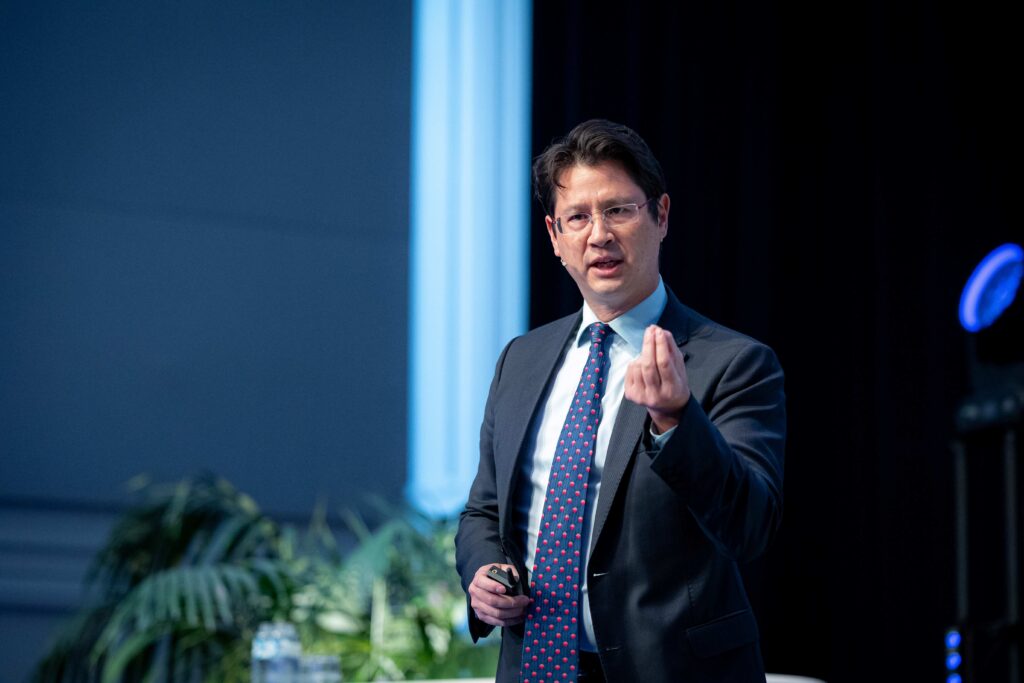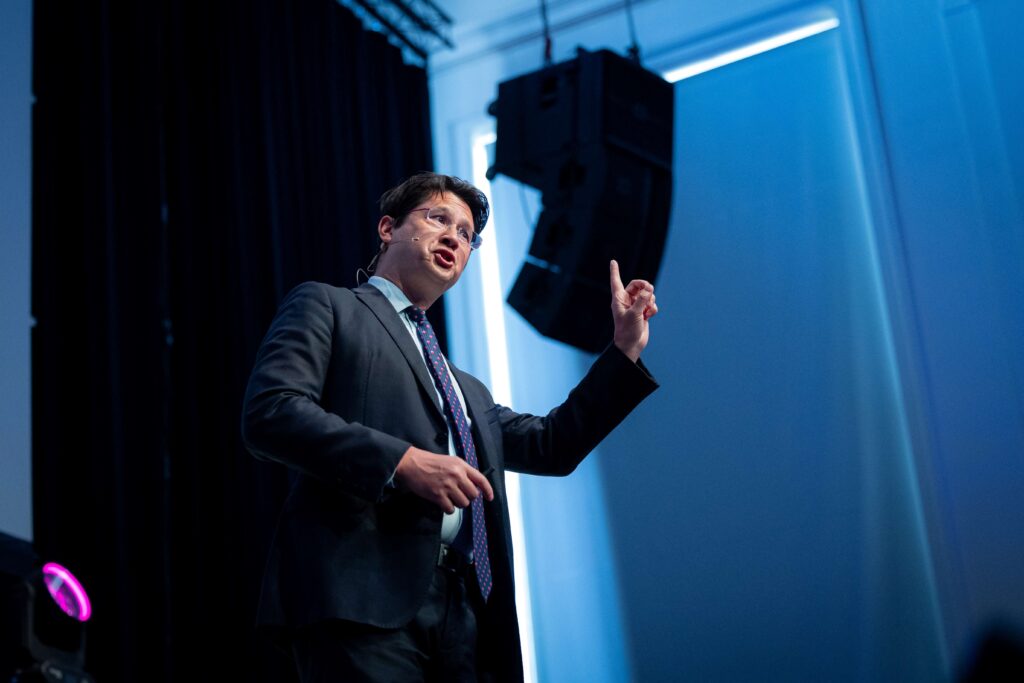The China dilemma: Challenging Europe’s assumptions
As Founder and Managing Director of the China Market Research Group, a well-known expert in articulating Chinese business dynamics and one of the most sought-after voices on the future of global economics, Shaun Rein was not at InnoHive 2025 to soothe European ears in Brussels. He was there to provoke.
“This is my first time back in mainland Europe since COVID-19,” he told the audience. “And it’s no coincidence that I’m here now. Because now is the moment for all of you to seriously think about what is happening in China.”
So began a keynote that did more than dissect and explain global economics in the context of shifting geopolitical tensions. It challenged the very foundations of how Europe sees China, sees America and sees itself in a world sliding into new alignments and global anxieties. With the spectre of a United States tariff war with China and other global players looming large, Rein emphasised: if Europe is to remain a relevant global player, it must embrace strategic pragmatism — potentially including engagement with China.

Shaun Rein, Founder and Managing Director of the China Market Research Group, giving a keynote at InnoHive 2025. Photo credit (c) Xavier Lejeune
Fear and misunderstanding
Rein was unapologetically direct as he tackled the first elephant in the room: fear — of China’s growing influence, of potential geopolitical repercussions and of the uncertainty surrounding an increasingly polarised global landscape.
“Fear doesn’t help,” he said. “The next three to six months are going to be critical — for your careers, your companies, your strategies. So I want you to look at what’s really happening in China. Look at real data, not misinformation.”
It was more than just a call for a shift in what he clearly sees as a negative China mindset, a rebuke of what he sees as Europe’s risk-averse posture toward the country. China is a nation, he argues, reawakening from a three-year COVID-induced slumber, hungry to innovate, invest and engage globally.
But his candour cut both ways. “Let’s be honest, though,” he continued. “China’s economy is weak right now. Youth unemployment is high. Real estate is in crisis. Families are pessimistic. For the first time, Chinese parents don’t believe their children will have better lives than they did.”
The pandemic was very tough on China and on the Chinese people, an experience for many that transformed consumer sentiment there into one of caution and conservatism. Consumers are saving. They’re trading down. The optimism of the 1990s and early 2000s has ebbed.
“And this is exactly why it’s the time to engage,” he said with a knowing smile.
The shifting global order
In one of the most surprising turns of his talk, Rein shared an observation that probably surprised many in the room: “A lot of Chinese people prefer the current American administration,” he said. It wasn’t a political endorsement. It was insight. Rein explained that the transactional approach is seen in China as something to work with. Europe, he argued, should take note.
China wants clear rules and is playing the long game. Chinese firms are willing to invest abroad, but only with the assurance that they will not be forced out after a few years by a sudden turn towards protectionism. Long-term market access, over a horizon of 10 to 15 years, is the price of their capital.
It’s also about reciprocity. “Invite Chinese companies to invest in Europe — but require them to engage in joint ventures. China did it with BMW and Volkswagen in the 1990s. That’s a fair ask. The Chinese will accept it.”

Shaun Rein, Founder and Managing Director of the China Market Research Group, giving a keynote at InnoHive 2025. Photo credit (c) Xavier Lejeune
Innovation in the shadows
While Western headlines focus on China’s demographic challenges and property meltdowns, Rein pointed out something else: resurgence. In recent weeks, China quietly released a generative AI model, developed and launched on the market for just USD 4–5 million — that’s just 10% of the cost of its Western equivalents, most notably ChatGPT. And it’s just as powerful, Rein claimed. “This was a moment of real national pride. Despite everything the West has thrown at them — tariffs, isolation, suspicion — they built something equal or better.”
Innovation has helped lift China’s middle class, fuelling economic growth and social change. Around 90% of lower- and middle-income Chinese are experiencing upward progression, with the rest close behind. This emerging consumer class has already reshaped China’s economy and the transformation is far from over. For Europe, this is a market too big to ignore.
The case for realignment
Rein did not sugarcoat the geopolitical complexities that will make any collaborations more difficult. He acknowledged that Chinese-European relations have cooled in recent years. Chinese firms haven’t felt welcome. European executives worry about political backlash. But he sees that as precisely where the opportunity lies.
China is bullish on Europe. Not because of ideology, but because Europe is seen as open to deal-making again.
Shaun Rein, Founder and Managing Director of the China Market Research Group
Europe, he argued, must take a strategic, not sentimental, approach. “You don’t have to agree with China’s system to respect its people and it as a nation.”
This, perhaps, was the heart of his thesis: respect, not reverence. Engagement, not endorsement.
A final challenge to Europe
Don’t write off China. Think strategically. Think long-term. China still has the infrastructure, the scale and the growth potential. This is your opportunity
Shaun Rein, Founder and Managing Director of the China Market Research Group
Whether or not European leaders take that opportunity may depend on whether they’re willing to challenge their own perceptions — of China, of the US and of their own place in the emerging global order.
As the applause faded at the end of his keynote, the murmurs in the room grew louder. These were notes not necessarily of agreement in what had been said, but of reflection — and this was exactly what Shaun Rein came to provoke.

